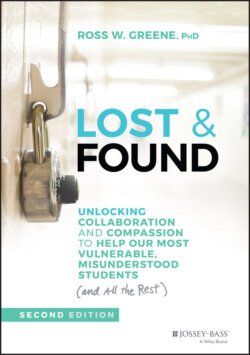Lost and Found

Реклама. ООО «ЛитРес», ИНН: 7719571260.
Оглавление
Ross W. Greene. Lost and Found
Table of Contents
List of Illustrations
Guide
Pages
PRAISE FOR LOST & FOUND
Lost & Found. Unlocking Collaboration and Compassion to Help Our Most Vulnerable, Misunderstood Students (and All the Rest)
PREVIOUS BOOKS BY ROSS W. GREENE, PHD
ABOUT THE AUTHOR
ACKNOWLEDGMENTS
INTRODUCTION
CHAPTER 1 WHO AND WHY
CHAPTER 2 OBSTACLES TO HELPING
CHAPTER 3 PARADIGM SHIFT
COMPONENT 3: FOCUS ON PROBLEMS, NOT BEHAVIORS
COMPONENT 4: THE PROBLEM SOLVING IS COLLABORATIVE, NOT UNILATERAL
COMPONENT 5: THE PROBLEM SOLVING IS PROACTIVE, NOT REACTIVE
UNHELPFUL LENSES
“They just want attention.”
“They just want their own way.”
“They're manipulating us.”
“They're unmotivated.”
“They're making bad choices.”
TWO ROLES FOR HELPERS
Q & A
CHAPTER 4 THE ALSUP
USING THE ALSUP
GUIDELINES FOR WRITING UNSOLVED PROBLEMS
HELPFUL MEETINGS
PRIORITIZING
Q & A
CHAPTER 5 THE PLANS
PLAN A
PLAN B
PLAN C
Q & A
CHAPTER 6 SOLVING PROBLEMS TOGETHER
THE EMPATHY STEP
Possibility 1: The Kid Says Something
Drilling Strategy 1: Reflective Listening (Accompanied by Clarifying Questions or Statements)
Drilling Strategy 2: Asking “W” questions (Who, What, Where, or When)
Drilling Strategy 3: Asking about the Situational Variability of the Unsolved Problem
Drilling Strategy 4: Asking the Student What They're Thinking in the Midst of the Unsolved Problem
Drilling Strategy 5: Breaking the Unsolved Problem Down into Its Component Parts
Drilling Strategy 6: Making a Discrepant Observation
Drilling Strategy 7: Tabling (and Asking for More Concerns)
Drilling Strategy 8: Summarizing (and Asking for More Concerns)
Possibility 2: The Student Says Nothing or “I Don't Know”
Possibility 3: The Student Says, “I Don't Have a Problem with That” or “I Don't Care”
Possibility 4: The Student Says “I Don't Want to Talk about It Right Now”
Possibility 5: The Student Becomes Defensive and Says Something Like “I Don't Have to Talk to You”
THE DEFINE ADULT CONCERNS STEP
THE INVITATION STEP
Q & A
CHAPTER 7 DEBUGGING
YOU’RE NOT ACTUALLY USING PLAN B
YOUR TIMING IS OFF
YOU WERE IN A HURRY
TMI
THE KID LIED ABOUT HIS CONCERNS
THE STUDENT COULDN'T THINK OF ANY SOLUTIONS
THE FIRST SOLUTION DIDN'T GET THE JOB DONE
DO-OVERS
Q & A
CHAPTER 8 THE HARDEST PART
GUIDING PRINCIPLES
PHASE ONE: THE CORE GROUP
PHASE TWO: DEMONSTRATING
PHASE THREE: COACHING
Teaching Colleagues about the Three Plans and Plan B
Demonstrating Plan B
Coaching Plan B
PHASE FOUR: CHANGING STRUCTURES
School Values
Time
Meetings and Special Education Referral Mechanisms
Reluctant Participants
Engaging Parents
Too Many Ingredients Can Spoil the Dish
Q & A
CHAPTER 9 FRINGE BENEFITS
ENHANCEMENT OF SKILLS
ENDING RESTRAINT, SECLUSION, AND CORPORAL PUNISHMENT
ENDING DISPROPORTIONALITY
Q & A
INDEX
WILEY END USER LICENSE AGREEMENT
Отрывок из книги
“Dealing with challenging behaviors? The first goal is to alter your lenses, to understand that challenging behavior is the result of lagging skills. The second is to start solving problems together and teach those skills. Lost and Found is a must read.”
—MICHELLE GARCIA WINNER, MA-CCC, SPEECH LANGUAGE PATHOLOGIST; FOUNDER, SOCIAL THINKING
.....
Student Plan B Conversation/Interview
RESULTS/FINDINGS:
.....